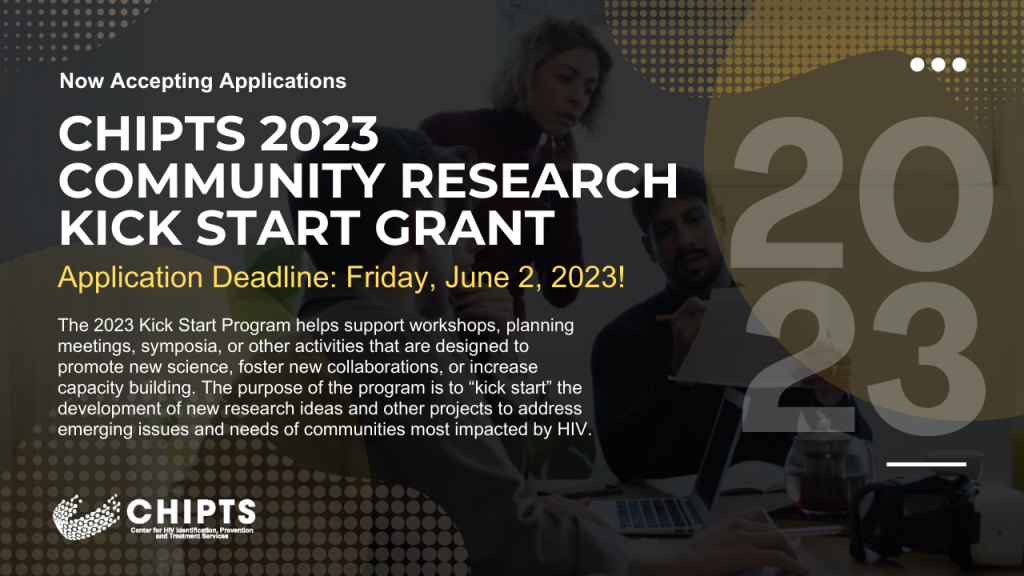
General Information:
CHIPTS is accepting applications for our 2023 Community-Research Kick Start Program. This funding opportunity is to help support workshops, planning meetings, symposia, or other activities that are designed to promote new science, foster new collaborations, or increase capacity building. The purpose of the program is to “kick start” the development of new research ideas and other projects to address emerging issues and needs of communities most impacted by HIV. Community collaborations and partnerships are strongly encouraged.
The proposed activities must contribute towards CHIPTS scientific theme of addressing the intersection of HIV/AIDS treatment and prevention and mental health and/or substance use co-morbidities.We encourage submissions that specifically address social and structural determinants of health (e.g., housing insecurity, stigma, andracism), resiliency, and protective factors, and the intersection of HIV/AIDS with sexually transmitted infections, substance use and mental health disorder syndemics. HIV-related health outcomes (e.g., HIV testing; PrEP uptake, adherence, continuation; HIV care continuum) should be examined. Applications that explore the impact of disruptors (such as COVID-19, MPOX) on HIV prevention, substance use, and/or mental health services (e.g., expansion of telehealth, self-testing, etc.) for communities affected by HIV are also encouraged.
The funding amount can range from $500 up to $5,000 direct costs, based on proposed activities. Note that for institutions outside of UCLA, the amount of funding available may be affected by the institution’s indirect cost rate. Proposals may be funded in whole or in part, and no single award will exceed $5,000. Awards for this funding cycle must be spent by December 31, 2023. All spending is subject to federal restrictions. Progress reports will be required 90 days from project start date, and within 60 days from project end date. Awardees should acknowledge the CHIPTS grant in work supported by the award and are required to present their work at a CHIPTS event such as the HIV Next Generation Conference or a CHIPTS Community Advisory Board meeting.
Awards for this funding cycle must be spent by December 31, 2023. All spending is subject to federal restrictions. Progress reports will be required 90 days from project start date, and within 60 days from project end date. Awardees should acknowledge the CHIPTS grant in work supported by the award, and are required to present their work at a CHIPTS event such as the HIV Next Generation Conference or a CHIPTS Community Advisory Board meeting.
Deadline for applications is Friday, June 2, 2023. Proposals are reviewed and decided upon by the CHIPTS leadership committee. Notification of awards will be made by June 23, 2023. Application packet should be submitted via email to Damilola Jolayemi at OJolayemi@mednet.ucla.edu.
Download: 2023 CHIPTS Community Research Kickstart Grant
Requirements:
- The funds must be spent by December 31, 2023. Any unused funds will be forfeited and returned back to us. If you anticipate delays in spending by the due date, contact CHIPTS immediately.
- All expenses must be deemed allowable under university and NIH federal guidelines and policies. If you have any budget related questions, please direct them to JBaughman@mednet.ucla.edu.
- Acknowledge and cite the CHIPTS grant number (P30MH058107) in work supported by the award. The CHIPTS logo may be requested for use as appropriate, on any marketing materials, reports, publications, and other products that are derived from this funding source.
- A brief 3-month progress update must be submitted by October 31, 2023. The progress report will include the status of the project, collaborations, reports/publications, and any planned projects stemming from the original proposal.
- An expense report that details all project expenses – actual and projected must be submitted by December 4, 2023. Funds must be spent by December 31, 2023.
- Awardees must be willing to present their work at a CHIPTS event such as the HIV Next Generation Conference or a CHIPTS Community Advisory Board meeting.
Awardees:
Vanessa Warri – “A Community-Based Participatory Action Research Initiative for Trans Futures in Health and Scientific Knowledge”
Felipe Findley – “Mobilizing to Address Intersections of Mass Incarceration and HIV/STIs as a framework to End HIV in Los Angeles County”
Ricardo Lepe – “Desde su perspectiva: Encuentros informativos sobre la experiencia transgénero (Translation: From their point of view: Informative encounters on the transgender experience”
Cherie S. Blair, MD – “HIV, Methamphetamine Use, and Pulmonary Hypertension: From Blue Skies to an Integrated Research Agenda”
Sid Ganesh – “1st Annual Harm Reduction in Clinical Praxis Conference 2021”
Caleb Garcia – “UCLA Sexual Health and Wellness Fair”
Gerald Garth – “Black Equity for Transgender Resources (BETR): A Series of Intersectional Health and Wellness Black Transgender Women’s Community-Based Participatory Forums
Charles McWells – “Velvet Jesus Community – Level Intervention”
Robert Bolan, MD and Risa Flynn – “HIV Prevention During the COVID-19 Pandemic: Engaging Experts to Discuss Innovative Strategies for Identifying Untreated Syphilis Infections”
Michael Li, PhD and Pam Ogata, MPH – “Mental Health Landscape Assessment: First Step in Ending the Epidemics through Health Equity”
Cathy Reback, PhD – “The Impact of COVID-19 on Service Utilization, Quality of Life, Physical/Mental/Sexual Health, and Substance Use among Sexual/Gender Minority Individuals Experiencing Syndemic Health Disparities”
Latoya Small, PhD, Mariela Ceballos, and Natalie Sanchez, MPH – “No Longer Invisible: Examining changes in services for Women of Color living with HIV /AIDS before and after COVID-19”
Jesse Clark, MD, MSc – “Contingency Management, Substance Use, and HIV Prevention: Defining an Integrated Research Agenda”
Sid Jordan, PhD and Ian Holloway, PhD – “Trans Masculine Health Justice Research Initiative”
